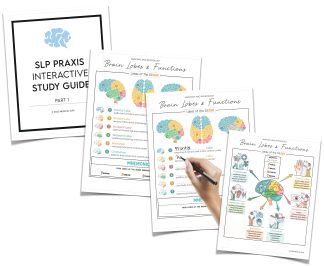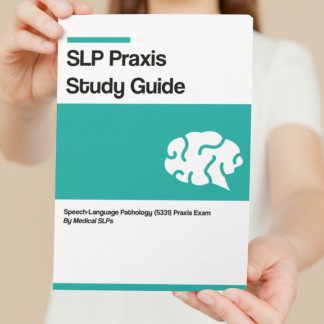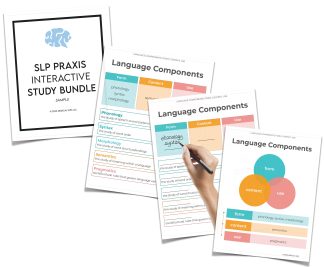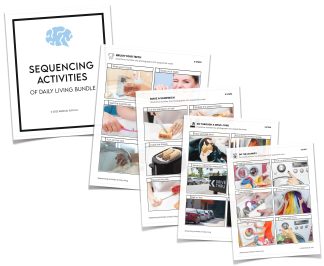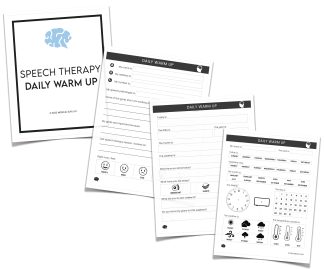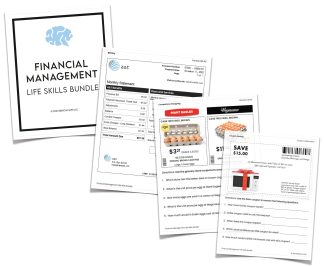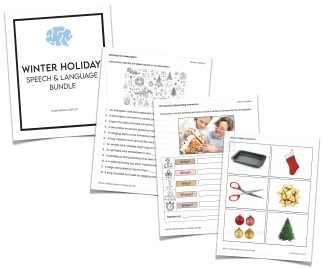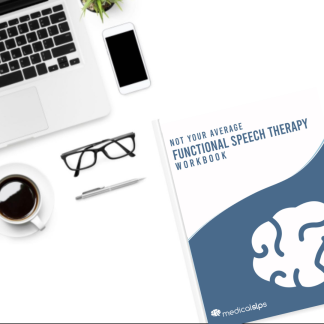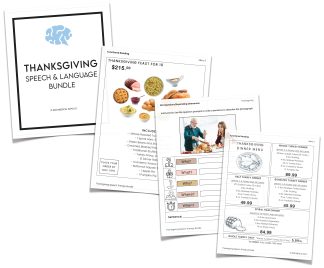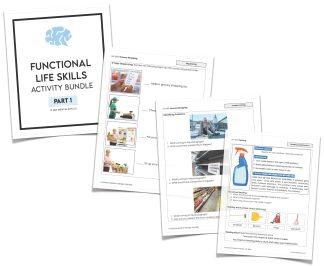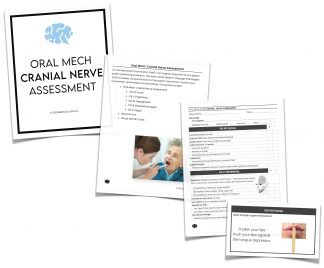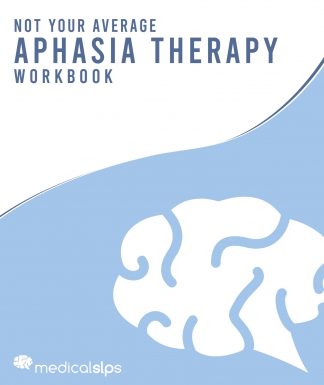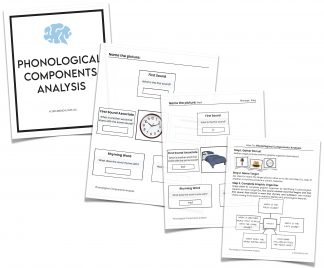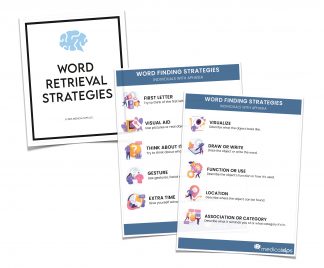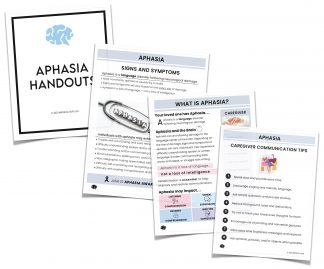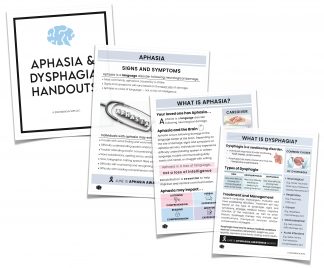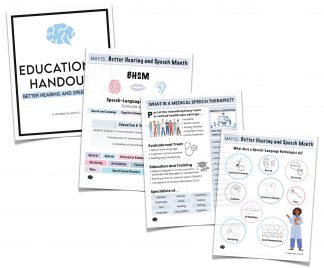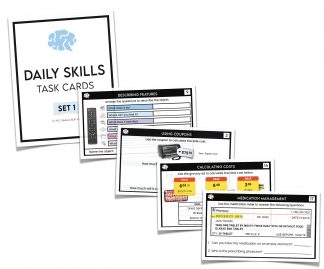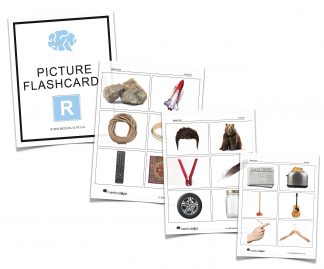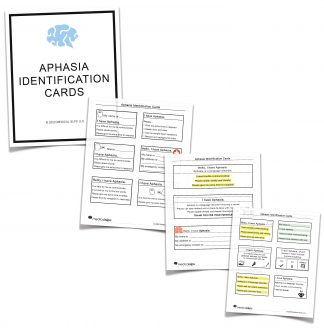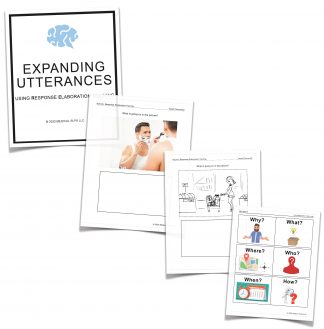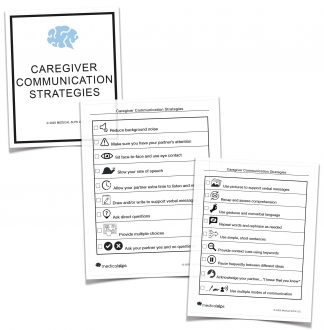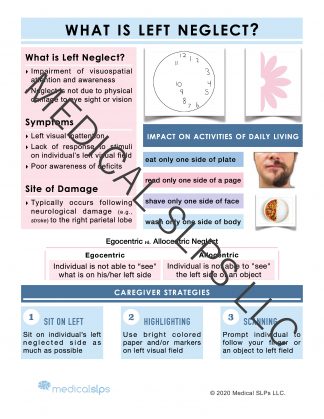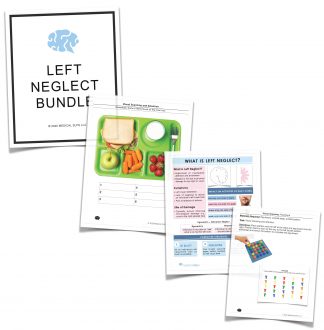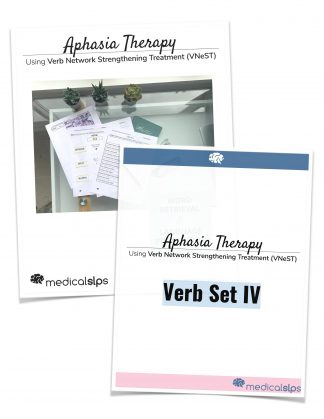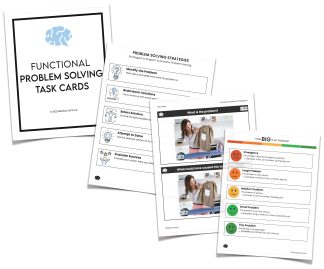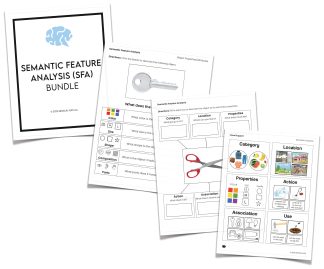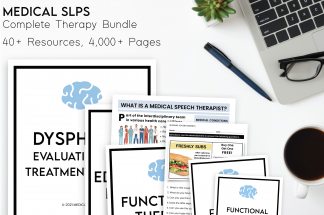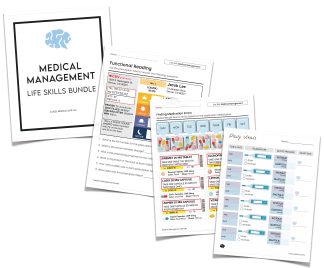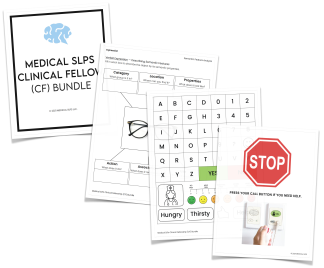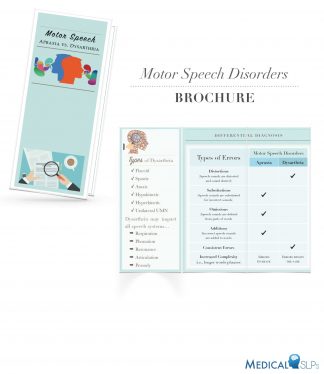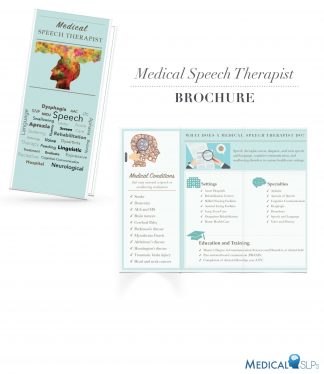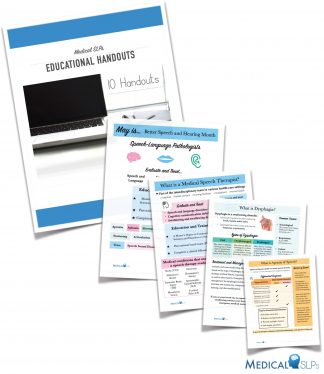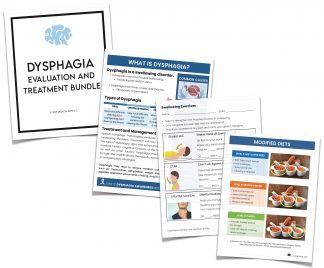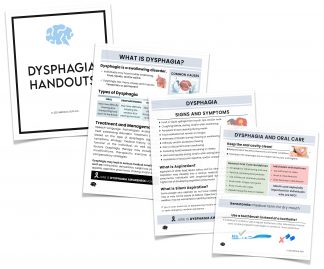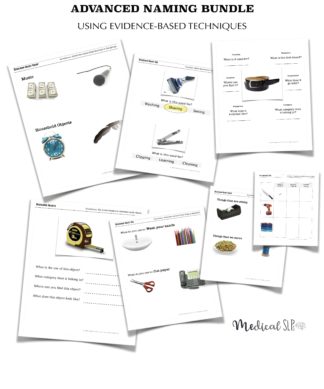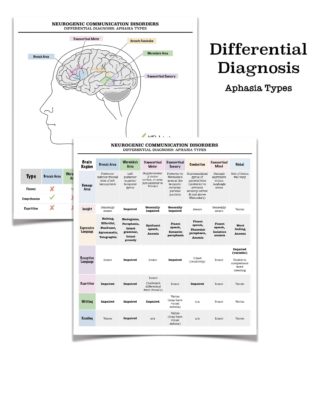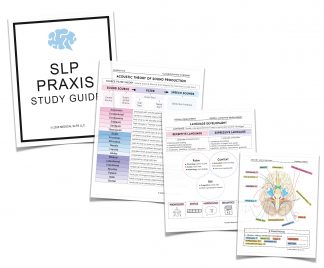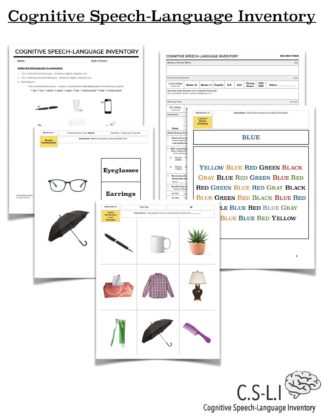Speech and Language Pathology
Speech and language activities, worksheets, evaluations, and handouts. Printable PDF activities and worksheets. Free and for sale therapy materials.
Showing all 44 resultsSorted by latest
-
SLP Praxis Interactive Study Guide – Part 1
$19.99 Add to cartThe SLP Praxis Interactive Study Guide Part One created by Medical SLPs© contains active, visual learning activities to help students prepare for the national Praxis® examination administered by Educational Testing Services (ETS). Designed to be both educational and fun, this interactive study guide creates a unique learning experience.
Part one of the interactive study guide includes content from the first four sections of the Medical SLPs© Speech-Language Pathology Praxis Examination Study Guide.
Contents
Section I. Typical Development
Linguistic Stages
Perlocutionary Stage
Vocabulary Norms
Developmental Milestones
Receptive Speech and Language
Expressive Speech and Language
Morphological Development
Pronoun Development
Age-Related Changes
Language Development
Theories of Language Development
Speech Development NormsSection II. Phonetics
Distinctive Features
Voice-Place-Manner
International Phonetic Alphabet
English Consonants
English Vowels and DiphthongsSection III. Foundations
Speech Systems
Speech Science
Speech ChainSection IV. Anatomy and Physiology
Nerves and Neurons
Oral Cavity
Pharynx and Larynx
Vocal Folds
Lingual Muscles
Muscles of Mastication
Anatomical and Positional Terms
Nervous System
Neuroanatomy and The Brain
Blood Supply
White Matter Tracts
Cranial Nerves
Respiratory System
Vertebral Column -
SLP Praxis Examination Study Guide
$99.00 Buy on AmazonThe Speech-Language Pathology Praxis Examination Study Guide created by Medical SLPs© is a comprehensive study resource filled with outlines, visual graphs, multiple-choice practice questions, and more and is designed to help students prepare for the national Praxis® examination administered by Educational Testing Services (ETS). Passing of the Speech-Language Pathology Praxis (5331) examination is one of several required components for obtaining the Certificate of Clinical Competence for Speech-Language Pathology (CCC-SLP) awarded by the American Speech-Language-Hearing Association (ASHA). A score of 162 is required to pass the SLP Praxis exam for purposes of ASHA certification. Most states have the same score requirements as ASHA, however, it is important to check your local state licensure guidelines as passing standards may vary state by state.
Includes:
‣ 140 + Pages
‣ High-Resolution, Full-Color Graphics
‣ Test (5331) Information
‣ Studying Checklist
‣ Comprehensive Outlines
‣ Figures, Graphs and Charts
‣ Practice Test Questions
‣ Answer Key -
SLP Praxis Interactive Study Bundle (Free Sample)
$0.00 Add to cartInteractive language studying worksheets, includes:- language components
- receptive vs. expressive language
- language theories
-
Sequencing Activities of Daily Living (ADLs) Bundle
$24.99 Add to cartThe Sequencing Activities of Daily Living (ADLs) Bundle includes worksheets and step-by-step visuals that can be used to sequence daily routines.
What is sequencing? Sequencing is a fundamental component of executive functioning. It includes our ability to plan, organize and execute multi-step tasks. This resource can be used to sort 4 and 6 step sequences while targeting a variety of cognitive-linguistic goals. Increase task complexity by varying the number of steps. Once the client can successfully sequence the visuals, evaluate their ability to independently complete each task.
Includes:
200+ Pages
Sequencing Cards
Functional Activities
Real Life Images
No-Prep Worksheets
Answer Key
+ More!Hygiene
- Brush your teeth
- Wash your hands
- Shave your face
- Shave your legs
- Take a shower
- Wash your hair
- Get dressed
- Put on deodorant
Household
- Do the laundry
- Use the dishwasher
- Vacuum the floor
- Make the bed
- Take out the trash
- Go food shopping
- Hang a picture
- Move to a new home
- Build a house
- Clean the window
- Clean the toilet
- Change an air filter
- Set the table
- Clean up after dinner
Meals
- Make a pizza
- Make a sandwich
- Hard boil eggs
- Cook pasta
- Make a cup of coffee
- Dine-in restaurant
- Go through a drive-thru
- Bake a cake
- Make cereal
- Make a salad
- Order a pizza
- Pack a lunch box
Community
- Withdraw money (ATM)
- Drive a car
- Pump your gas
- Fill a prescription
- Take a taxi
- Ride the bus
- Book a vacation
- Get married
Personal/Other
- Mail a letter
- Send an email
- Wake up
- Make a phone call
- Wrap a present
- Send a package
-
Speech Therapy Daily Warm Up
$9.99 Add to cartDaily warm up activities that target life skills
-
Calipso Clock Hours Tracking Forms
$4.99 Add to cartThis resource can be useful for tracking SLP clinical clock hours. Tracking sheets are formatted to match the Calipso website for easy data transfer!
-
Financial Management Life Skills Bundle
$19.99 Add to cartThe Financial Management Life Skills Bundle includes 160+ pages of treatment activities that simulate real-world math skills such as counting money, paying utility bills, comparison shopping, calculating taxes, and much more. Gather financial documents from your patients and use “real” money to improve carryover and generalization skills.
Bill Pay
- Sample Bills
- Invoice Receipts
- Earnings/Pay Stubs
Coupons/Savings
- Comparison Shopping
- Item and Store Coupons
- Menu Math
- Receipt Math
- Percentage Discounts
Money
- Making Change
- Counting Money
- Calculating Sales Tax
- Estimating Flooring Costs
- Calculating Rent Costs
- Checkbook Math
- Writing Checks
- Using a Credit Card
- Calculating Medical Expenses
Personal Finances
- Monthly/Yearly Personal Expense Tracker
-
Winter Holiday Speech and Language Bundle
$19.99 Add to cartThe Winter Holiday Speech and Language Bundle includes 65+ pages of functional winter holiday-themed speech therapy activities designed to save you time! Useful for both children and adults, this resource is just in time to engage your patients with the upcoming holidays.
Contents:
Word Retrieval
- 78 Winter Holiday Vocabulary Photo Cards
- Phrase Completion
- Generative/Divergent Naming
- Naming from Description
- Naming by Letter
- Semantic Features
- WH Questions/Expanding Utterances
Functional Reading
- Recipes
- Menus
Orientation/Memory
- Blank Calendar
- Functional Recall Activities
Executive Function
- Thought Organization – New Year’s Resolution
-
Not Your Average Functional Speech Therapy Workbook
$99.00 Buy on AmazonThe Functional Speech Therapy Workbook contains five sections and includes 340+ pages of functional activities that can be used to target real world cognitive-linguistic skills. Over the last decade, Person-centered care (PCC) has become the new standard across healthcare settings. Speech-language pathologists (SLPs) are “expected to provide PCC as part of their therapeutic interactions” (DiLollo & Favreau, 2010). Based on a person-centered care model, SLPs should select functional goals, plan functional treatment activities, and report functional gains (Elman & Bernstein-Ellis, 1995). But what does ‘functional’ therapy really mean? It is important that the patient and his or her family is involved in the treatment plan, especially when setting individualized short- and long- term goals. Ultimately, the goal of treatment should aim to maximize independence and improve quality of life. Unlike a typical workbook, this resource is packed with practical and relevant treatment materials that support this model and promote generalization into activities of daily living.
- 300 + pages
- Person-centered therapy
- Treatment ideas and activities
- No-prep worksheets
- Compensatory strategies
- + more!
-
Thanksgiving Speech and Language Bundle
$15.99 Add to cartThe Thanksgiving Speech and Language Bundle includes 85+ pages of functional Thanksgiving-themed speech therapy activities designed to save you time! Useful for both children and adults, this resource is just in time to engage your patients with the upcoming holiday.
Word Retrieval
- 60 Thanksgiving Vocabulary Photo Cards
- Phrase Completion
- Paragraph Completion
- Generative/Divergent Naming
- Naming from Description
- Semantic Features
- WH Questions/Expanding Utterances
Functional Reading
- Thanksgiving Recipes
- Reading Menus
Orientation/Memory
- Blank Calendar
- Functional Recall Activities
Executive Function
- Deduction Puzzles
- “Thankful for” Worksheets
-
Functional Life Skills Activity Bundle
$24.99 Add to cart -
Oral Mech Cranial Nerve Assessment with Visual Cards
$4.99 Add to cartAn Oral Mechanism Examination (OME) is an integral component of any speech and/or swallowing evaluation. This exam allows Speech-Language Pathologists (SLPs) to assess structure/function of the speech mechanism, cranial nerve involvement, and interpret clinical findings. This packet includes:
- Oral Mech: Cranial Nerve Assessment
- CN VII Facial
- CN V Trigeminal
- CN XII Hypoglossal
- CN IX Glossopharyngeal
- CN X Vagus
- Record Form
- 20 Visual Stimuli Cards
- Oral Mech: Cranial Nerve Assessment
-
Not Your Average Aphasia Therapy Workbook
Rated 5.00 out of 5Sale!450+ page hard copy fulfilled by Amazon
The Aphasia Therapy Workbook is divided into four parts and includes 450+ pages of functional therapy materials that can be used to target a variety of receptive and expressive language skills in persons with aphasia. Each section features research-based techniques, therapy ideas, treatment tasks, sample goals, and much more. Designed to support both new and experienced clinicians, this comprehensive workbook contains practical and relevant resources to treat aphasia.
Discounted with your Amazon Prime membership!
What’s inside!
$124.99Original price was: $124.99.$99.00Current price is: $99.00. Buy on Amazon -
Dysphagia Exercise Packet
$29.99 Add to cartSwallowing is a complex process that involves a number of different muscles and nerves. Dysphagia is a swallowing disorder, individuals may have difficulty swallowing food, liquids, and/or their own saliva. Dysphagia can lead to serious medical conditions such as aspiration pneumonia, dehydration, malnutrition, or other complications. Treatment for dysphagia may include diet modifications, swallowing exercises and maneuvers, compensatory techniques, and postural changes. This document includes easy to read dysphagia exercise handouts for the following eight (8) exercises:
- Shaker Head Lift
- Mendelsohn Maneuver
- Chin Tuck Against Resistance (CTAR)
- Effortful Swallow
- Supraglottic Swallow
- Super Supraglottic Swallow
- Pitch Glide
- Yawn Exercise
-
Phonological Components Analysis (PCA) Packet: Aphasia Treatment
$14.99 Add to cartWhat is Phonological Components Analysis?
Developed and modeled after Semantic Feature Analysis (SFA), Phonological Components Analysis (PCA) is an evidence-based technique that aims to improve awareness of phonological properties of words and support word retrieval in PWA. First introduced by Leonard et al. (2008), PCA showed positive outcomes in 7 out of the 10 individuals studied and some generalization for untrained words. Van Hees et al. (2013) further investigated PCA by comparing it to SFA. In this study, 7 out of 8 people showed improvements for treated words with PCA and only 4 people showed improvements with SFA (Van Hees et al., 2013). Van Hees et al., 2013 suggests that individuals with semantic difficulties will likely have more success with PCA and it is expected that individuals with phonological deficits will show improvements with both treatment techniques.
Leonard, C., Rochon, E., & Laird, L. (2008). Treating naming impairments in aphasia: Findings from a phonological components analysis treatment. Aphasiology, 22(9), 923-947.
Van Hees, S., Angwin, A., McMahon, K., & Copland, D. (2013). A comparison of semantic feature analysis and phonological components analysis for the treatment of naming impairments in aphasia. Neuropsychological Rehabilitation, 23(1), 102-132.
This PDF includes:
- PCA how-to guide
- 1 Data tracking form
- 113 Target pictures
- PCA treatment activities
- Cueing examples
- Answer keys
-
Word Retrieval Strategies
$9.99 Add to cartWord retrieval strategies for Aphasia:
- FIRST LETTER
Try to think of the first letter. Scan the alphabet for help. - VISUAL AID
Use pictures or real objects. - THINK ABOUT IT
Try to think about what you want to say before you say it. - GESTURE
Use gestures, facial expressions, and pointing. - EXTRA TIME
Give yourself extra time, the word may come to you. - VISUALIZE
Describe what the object looks like. - DRAW OR WRITE
Draw the object or write the word. - FUNCTION OR USE
Describe the object’s function or how it’s used. - LOCATION
Describe where the object can be found. - ASSOCIATION OR CATEGORY
Describe what it reminds you of or what category it’s in.
- FIRST LETTER
-
Handout: Aphasia
$0.00 Add to cartWhat is Aphasia?
Aphasia is a language disorder following neurological damage, most commonly, caused by a stroke. Depending on the site of damage, signs and symptoms of aphasia will vary. Individuals may experience difficulty understanding spoken or written language, trouble communicating daily wants and needs, or struggle with writing. Aphasia is a loss of language — not a loss of intelligence.
-
Aphasia & Dysphagia Handouts
Rated 4.50 out of 5Sale!7 handouts for Aphasia and Dysphagia
$4.99Original price was: $4.99.$0.00Current price is: $0.00. Add to cart -
Handout: May is Better Hearing & Speech Month (BHSM)
$0.00 Add to cartMay is.. Better Hearing and Speech Month (BHSM)
Includes BHSM and What does a Speech-Language Pathologist do? handouts
-
Daily Skills Task Cards – Set 1
$24.99 Add to cartDaily Skills Task Cards: Set 1
This set includes 180 treatment task cards that can be used to target various cognitive-linguistic goals while practicing everyday life skills. Print and laminate cards or use this set digitally.
Included
- Sequencing: 6 cards
- Yes/No Questions: 10 cards
- Expanding Utterances: 16 cards
- Describing Features: 16 cards
- Daily Routines: 10 cards
- Object Identification: 20 cards
- Object Matching: 6 cards
- Object Function: 10 cards
- Medication Management: 20 cards
- Calculating Costs/Store Ads: 20 cards
- Using Coupons: 20 cards
- Reading Receipts: 6 cards
- Weather Forecast: 6 cards
- Generative Naming: 10 cards
- Reading Community/Safety Signs: 6 cards
- Answer Key
-
Picture Flashcards – R Words
Sale!This PDF includes 144 high quality picture stimuli flashcards (R words) with the associated written cue.
Included:
– 24 R Initial Position
– 24 R Medial Position
– 24 R Final Position
– 12 R Initial + Final Position
– 12 Br blends
– 12 Cr blends
– 12 Dr blends
– 12 Gr blends
– 12 Fr blends$4.99Original price was: $4.99.$0.00Current price is: $0.00. Add to cart -
Medical Tracking Bundle
$14.99 Add to cartThis bundle was developed by Medical SLPs and includes 40+ medical tracking templates that can be used to create a medical binder for your patients. Select functional, relevant pages for your clients to target various goals such as: organization, problem solving, reading, writing, memory, attention, and more. Once created into a personalized binder, patients can track medical information and practice compensatory memory strategies for functional everyday tasks.
Included:
– Cover Page
– Medical History + Information
– Appointment Tracker
– Medication Schedule + Log
– Vitamin Schedule + Log
– Dental Log
– Blood Pressure Log
– Blood Sugar Log
– Weekly Water Tracker
– Daily Water Tracker
– Fitness Tracker
– Daily Walking Log
– Daily Sleep Log
– Weekly Food Log
– Fruit and Vegetable Log
– Daily Activity Logs
– Telephone Log
– Symptoms Tracker
– Lab Tests + Imaging
– Daily Stretching Log
– Deep Breathing Log
– Daily Mood Tracker
– Medical Contacts
– My Primary Doctor
– My Physical Therapist
– My Occupational Therapist
– My Speech Therapist
– My Notes
-
Aphasia Identification Cards
Rated 5.00 out of 5Sale!This resource includes 27 aphasia identification wallet cards. Print, personalize, and provide these cards to your clients with aphasia to support daily communication exchanges.
$9.99Original price was: $9.99.$4.99Current price is: $4.99. Add to cart -
Expanding Utterances Using Response Elaboration Training
$19.99 Add to cartResponse Elaboration Training (RET; Kearns, 1985) is a treatment technique that focuses on expanding utterances and increasing content words in conversations in persons with aphasia (PWA) (Kearns, 1985; Gaddie, Kearns, & Yedor, 1991). This resource includes information on how to use RET, sample treatment goals, a data tracking form, visual prompts, 49 action target pictures (colored photographs and line drawings), and clinician elaboration examples.Kearns, K.P. (1985). Response elaboration training for patient initiated utterances. Clinical Aphasiology, 15, 196-204.
Gaddie, A, Kearns, K.P., & Yedor, K. (1991). A qualitative analysis of response elaboration training effects. Clinical Aphasiology, 19, 171-183.
-
Handout: Caregiver Communication Strategies
$4.99 Add to cart2 free handouts: caregiver communication strategies with picture symbols
-
Handout: Left Neglect
$0.00 Add to cartThis free handout is useful for SLPs working with people who are experiencing left neglect and visual inattention.
-
Left Neglect Bundle
$14.99 Add to cartThe Left Neglect Therapy Bundle includes 50+ pages of activities that may be used to target left visual attention and awareness. Practice intervention techniques during everyday tasks to improve carryover and generalization.
Included…
- What is Left Neglect?
- Quick Assessment
- Clock Drawing
- Anchoring
- Visual Scanning
- Cancellation Tasks
- Line Bisection
- Symmetrical Drawing
- Connecting Lines
- Locating Symbols/Letters/Numbers
- Locating Objects
- Peg Board Patterns
-
VNeST – Set IV
$9.99 Add to cartSet IV – Verbs: serve, shoot, sign, sort, study, teach, throw, trap, wash, weigh, write
Introduction
Verb Network Strengthening Treatment (VNeST) is an evidence-based technique that focuses on using verbs to target word retrieval and discourse for persons with aphasia. This intervention has shown promising evidence for language production and generalization of lexical retrieval to trained and untrained verbs (Edmonds & Babb, 2011; Edmonds et al., 2014; Edmonds et al., 2009). This resource saves you time and includes everything you need to begin using VNeST with your clients.
Included…
- Each set includes *11 sample verbs
- No prep templates (for each step of protocol)
- Sample responses (for each verb)
- Client data tracking forms
- Clinician cueing guide
- Sample cues (semantic, multiple choice, & picture prompts)
- Semantic judgement sentences (12 for each verb)
Edmonds, L. A. (2014). Tutorial for Verb Network Strengthening Treatment (VNeST): Detailed Description of the Treatment Protocol with Corresponding Theoretical Rationale. SIG 2 Perspectives on Neurophysiology and Neurogenic Speech and Language Disorders, 24, 78-88.
Edmonds, L. A. (2016). A Review of Verb Network Strengthening Treatment. Topics in Language Disorders, 36, 123-135.
Edmonds, L. A., & Babb, M. (2011). Effect of Verb Network Strengthening Treatment in moderate-to-severe aphasia. American Journal of Speech-Language Pathology, 20, 131-145.
Edmonds, L.A., Mammino, K., & Ojeda, J. (2014). Effect of Verb Network Strengthening Treatment (VNeST) in persons with aphasia: Extension and replication of previous findings. American Journal of Speech-Language Pathology, 23, S312-S329.
Edmonds, L. A., Nadeau, S., & Kiran, S. (2009). Effect of Verb Network Strengthening Treatment (VNeST) on lexical retrieval of content words in sentences in persons with aphasia. Aphasiology, 20, 644-675.
-
Copy And Recall Treatment (CART) Worksheets
$9.99 Add to cartCopy And Recall Treatment (CART) Worksheets (80+ pages and 120 sample target images)
CART is a lexical writing treatment technique focused on improving writing skills for communication in individuals with severe aphasia (Beeson, 1999; Beeson, et al., 2002). Stimuli selected should be personalized and relatable to each client. Practice includes copying target words and progresses to writing words from recall. The CART protocol includes training functional words in sets of five and incorporates a daily homework component six days a week (Beeson, et al., 2002). The activities in this packet were adapted from and are based on the CART protocol (Beeson, et al., 2002).
Beeson, P.M. (1999). Treating acquired writing impairment. Strengthening graphemic representations. Aphasiology, 13(9-11), 767-785.
Beeson, P. M., Hirsch, F. M., & Rewega, M. A. (2002). Successful single-word writing treatment: Experimental analyses of four cases. Aphasiology, 16(4-6), 473-491.
-
Functional Problem Solving Cards
$24.99 Add to cartThis PDF contains 288 real-world task cards (with photos and illustrations) that can be used to target problem solving, reasoning, safety awareness, and more.
Sample prompts and goals are also included.
-
Semantic Feature Analysis (SFA) Bundle
$19.99 Add to cartSemantic Feature Analysis (SFA) is an evidence-based treatment technique designed to improve word retrieval and naming. SFA targets activation of semantic networks and patients are prompted to generate semantic features of set items (i.e., group/category, use/function, action, properties, location, and association). SFA has been found to be an effective approach in improving naming of trained nouns, as well as facilitate carryover, to untrained nouns (Boyle, 2004). A graphic organizer, pictures, and/or real objects can be used in therapy to practice this treatment intervention. Ultimately, the goal of SFA is to provide an effective strategy for word finding. Educate and encourage communication partners to implement SFA question prompts into everyday communication.
-
Medical SLP Therapy Bundle
Rated 4.33 out of 5Sale!Essential resources at your fingertips. Take your clinical practice to the next level with our entire suite of digital downloads at a discounted rate!
The Medical SLP Therapy Bundle is the ultimate all-in-one resource collection for Speech-Language Pathologists (SLPs) working in medical settings. Available exclusively at medicalslps.com, this comprehensive bundle includes every tool, template, assessment, therapy guide, and worksheet available on the site— designed to streamline and enhance your clinical practice.
With over 45 high-quality resources and more than 4,000 pages of content, the Medical SLP Therapy Bundle covers a diverse range of topics, including dysphagia, cognitive-communication disorders, aphasia therapy, and more. Each resource is thoughtfully designed to save you time and improve patient outcomes by providing evidence-based materials and practical, ready-to-use tools.
Whether you’re a seasoned professional or new to medical speech-language pathology, this bundle offers everything you need to deliver effective, evidence-backed therapy. It’s the most complete and cost-effective way to access all the resources on medicalslps.com in one convenient package.
Key Features:
- 45+ downloadable PDF resources
- Over 4,000 pages of practical content
- Wide range of medical SLP topics (dysphagia, aphasia, cognitive communication, etc.)
- Variety of settings (acute care hospitals, skilled nursing facilities, home health care, outpatient clinics, etc.)
Included products:
$390.00Original price was: $390.00.$299.00Current price is: $299.00. Add to cart -
Medical Management Bundle
$19.99 Add to cartThe Medical Management Life Skills Bundle includes worksheets and realistic activities that can be used to practice reading prescription labels, understanding prescribed doses, identifying pill organization errors, planning re-fills, and much more. Medication management, when it relates to cognitive-communication skills, is well within our scope of practice as Speech-Language Pathologists. Many of our patients take multiple medications on a daily basis and medication administration can be a complex multi-step process. To maximize independence and safety, it is important to address medication management and ensure that our patients are complying with their prescribed medication regimen. This resource also includes medical tracking forms and a guide to help you create your own medication management practice kit.
Contents:
Medical Vocabulary
- Confrontational Naming
- Phrase Completion
- Generative and Responsive Naming
- Expanding Utterances
Auditory Comprehension
- Yes/No Comprehension
- Object Discrimination
Problem Solving
- Following Directions, Sorting Pharmacy Items and Planning Re-fills
- Finding Pill Organization Errors
Functional Reading
- Insurance Cards, Prescription/Product Labels and Prescription Pads
- Medication List/Chart
Functional Writing
- Patient Forms
Templates
- Medication Management Practice Kit with Sample Labels
- Medication, Vital Signs, and Physician Log/Tracking Sheets
- Tips for Medication Management and Drug Safety
-
Medical SLP Clinical Fellow (CF) Bundle
Rated 4.89 out of 5$29.99 Add to cartA speech-language pathology clinical fellowship (CF) serves as a transitional professional experience following graduate school. Successful completion is required by the American Speech-Language-Hearing Association (ASHA) to obtain a Certificate of Clinical Competence (CCC) in Speech-Language Pathology. In addition to ASHA requirements, most states also require a clinical fellowship to obtain state licensure. Without the underlying knowledge and resources, the transition into a medical setting can be difficult.
This bundle was created as an educational guide to support new and experienced clinicians, as well as, offer functional intervention tools. This resource includes educational information on basic procedures and documentation, billing and coding, no-prep handouts and inservice templates, a comprehensive goal bank, functional therapy ideas, and much more. The included treatment activities simulate real-life skills and can be used to target functional relevant goals.
Contents:
I. Procedures and Considerations
- Documentation Procedures
- Goal Writing, Billing, and Coding
- Common Abbreviations and SLP Conditions
II. Forms and Evaluation
- Intake and Screening Forms
- Functional Case History Assessment
- Dysphagia Forms
III. Educational Handouts
- What is a Medical SLP?
- What is Dysphagia?
- Safe Swallowing Inservice
- Aphasia Differential Diagnosis
- What is Apraxia of Speech?
- What is Dysarthria?
IV. Treatment Materials
Comprehension and Expression- Description of everyday objects
- Personal yes/no questions
- WH – questions
- AAC and gesturing
- Functional phrase completion
- Pictures and symbols of everyday objects
- Describing semantic features
- Common object cueing flash cards
- Expanding utterances
- Generative naming
Reading and Writing
- Matching everyday objects
- Functional daily reading – menus, weather, medication labels
- Biographical and functional writing
Cognition
- Memory strategies and spaced retrieval
- Everyday sequencing
- Scheduling daily routines
- Printable safety signs
- Additional therapy ideas
Dysphagia
- Safe strategies
- Swallowing exercises
-
Motor Speech Disorders Brochure
$0.00 Add to cartA brochure that helps deferentially diagnose Apraxia of Speech (AOS) vs. Dysarthria
Includes:
Tips for communication partners
Types of Dysarthria -
Medical Speech Therapist Brochure
$0.00 Add to cartEducate students, staff, patients and caregivers with a brochure that includes:
WHAT DOES A MEDICAL SPEECH THERAPIST DO?
Speech therapists assess, diagnose, and treat speech
and language, cognitive-communication, and
swallowing disorders in various health-care settings.Settings
✓ Acute Hospitals
✓ Rehabilitation Centers
✓ Skilled Nursing Facilities
✓ Assisted Living Facilities
✓ Long Term Care
✓ Outpatient Rehabilitation
✓ Home Health CareSpecialties
✓ Aphasia
✓ Apraxia of Speech
✓ Cognitive Communication
✓ Dysphagia
✓ Dysarthria
✓ Speech and Language
✓ Voice and FluencyEducation and Training
✓ Master’s Degree in Communication Sciences and Disorders or related field
✓ Pass national board examination (PRAXIS)
✓ Completion of clinical fellowship year (CFY)Medical Conditions that may warrant a speech or
swallowing evaluation
✓ Stroke
✓ Dementia
✓ ALS and MS
✓ Brain tumors
✓ Cerebral Palsy
✓ Parkinson’s disease
✓ Myasthenia Gravis
✓ Alzheimer’s disease
✓ Huntington’s disease
✓ Traumatic brain injury
✓ Head and neck cancers -
Educational Handouts Bundle
Sale!10 Educational Handouts included in this bundle:
– What is Dysphagia?
– Dysphagia: Signs and Symptoms
– Dysphagia and Oral Care
– Dysphagia and Safe Swallowing
– What is Aphasia?
– Aphasia Differential Diagnosis
– What is Apraxia of Speech?
– What is Dysarthria?
– What is a Medical Speech Therapist?
– Better Speech and Hearing Month Handout$4.99Original price was: $4.99.$0.00Current price is: $0.00. Add to cart -
Aphasia Object Box Starter Kit
$14.99 Add to cartThis starter kit guides you to create your own object box with household items and successfully use it to address goals for verbal and written expression, auditory and reading comprehension, and cognitive communication skills.
Includes:
30 Object picture cards
• 2 Images + 1 symbol each
• 6 Visual cue cards
• Written word
• Word completion
• Phrase completion
• Description of object use, location, and properties
• Clinician prompt card
- Verbal expression
- Confrontational naming
- Object description
- Phrase completion
- Generative naming
- Auditory comprehension
- Object discrimination
- Following directions
- Reading comprehension
- Word recognition
- Phrase/Sentence discrimination
- Written expression
- Word completion
- Word/phrase/sentence level
- Cognitive communication
- Memory
- Problem solving/reasoning/WH-questions
- Categorical organization
- Verbal expression
-
Dysphagia Bundle
Rated 5.00 out of 5$24.99 Add to cartThe Dysphagia Evaluation and Treatment Bundle is designed for speech and language therapists working with patients who are experiencing difficulty swallowing. This bundle includes informative handouts, screening and evaluation forms, treatment examples, sample goals, daily documentation, and more.
Contents
Section I. Informative Handouts
- What is Dysphagia?
- Signs and Symptoms
- Dysphagia Risk Factors
- Oral Care
- Safe Swallowing Strategies
- Thickened Liquids and Modified Diets
- Swallowing Medications
- Modifications and Cueing
Section II. Assessment
- General Dysphagia Evaluation Guidelines
- Clinical Bedside Swallow Form
- Swallow Evaluation
- ICD-10 Coding Worksheet
Section III. Patient Recommendations
- Diet Recommendations and Modified Diets
- Instrumental Testing Recommendations
- Communication Forms
- Safe Swallowing Strategies
- Frazier Free Water Protocol
- Daily Food Log
Section IV. Treatment
- Dysphagia Treatment Guide
- Exercise Tracking Forms and Handouts
- Long- and Short- Term Goals
- Daily Note Documentation Examples
-
Handout: Dysphagia
Rated 4.33 out of 5Sale!What is Dysphagia?
Dysphagia is a swallowing disorder. Dysphagia has many causes and may be temporary or permanent. Treatment varies based on the type of dysphagia, signs and symptoms, etiology, medical history, cognitive function of the individual, as well as other factors.
$0.99Original price was: $0.99.$0.00Current price is: $0.00. Add to cart -
Advanced Naming Bundle
Rated 5.00 out of 5$14.99 Add to cartIncludes:– Semantic Feature Analysis (SFA)– Describing object use– Describing object group– Describing object location– Describing object by: use, category, location & properties– Describing object by: function, location, properties, action, association & category -
Handout: Aphasia Differential Diagnosis Chart
Sale!Differential diagnosis (DDX) for types of aphasia with impacted brain regions (Broca’s area, trancortical motor, trancortical sensory, conduction, transcortical mixed, global) and communication impact/disorders (expressive language, receptive language, repetition, writing, and reading).
This item is included in the Speech-Language Pathology (SLP) Praxis Study Guide
$0.99Original price was: $0.99.$0.00Current price is: $0.00. Add to cart -
SLP Praxis Study Guide
Rated 4.88 out of 5$39.99 Add to cartThe SLP Praxis Study Guide by Medical SLPs© includes 100+ pages of comprehensive outlines, visual graphs, multiple-choice practice questions, and more to help speech pathology students prepare for the national Praxis II ® examination administered by Educational Testing Service (ETS).
Includes 124 question practice test
Section 1. Typical Development
- Linguistic Stages
- Speech and Language Milestones
- Morphological Development
- Normal Development: Aging Adult
- Normal Language Development
- Theories of Development
- Phoneme Development
Section 2. Phonetics
- Distinctive Features
- International Phonetic Alphabet
- Classification Systems
- Consonants and Vowels
Section 3. Foundations
- Components of Communication
- Speech Systems
- Speech Science
Section 4. Anatomy and Physiology
- Anatomical Terms
- Nervous System
- The Human Brain
- Neuroanatomy
- Blood Supply
- Connecting Fibers
- Cranial Nerves
- Muscles of Mastication
- Respiratory System
- Phonatory System
- Head and Neck
Section 5. Professional Practice
- Research Designs
- Sampling Methods
- EBP: Levels of Evidence
- ICF: International Classification
- Epidemiology
- Standardized Testing
Section 6. Diagnostics
- Speech and Language
- Articulation and Phonology
- Language and Cognition
- Fluency and Stuttering
- Voice and Resonance
- Motor Speech
- Neurogenic Disorders
- Dysphagia and Swallowing
- Etiologies
- Functional vs. Organic
Section 7. Articulation and Phonology
- Classifying Errors
- Speech Sound Disorders
- Phonological Processes
Section 8. Language and Cognition
- Disorder, Delay, Difference
- Multicultural Differences
Section 9. Neurogenic Communication
- Disorders, Terms and Definitions
- Damaged Regions
- Aphasia Types
- Dysarthria Types
Section 10. Dysphagia and Swallowing
- Physiology
- Swallowing Disorders
- Screening and Assessment
- Treatment
Section 11. Fluency and Fluency Disorders
- Normal vs. Disordered
- Stuttering and Cluttering
Section 12. Voice and Resonance
- Disorders
- Voice Diagnostics
- Voice Characteristics
Section 13. Auditory System
- Anatomy and Physiology
- Audiometric Testing
- Audiogram
- Tympanometry
Section 14. Genetics
- Syndrome, Sequence, Association
- Craniofacial Malformations
Section 15. Disorders
- Cerebral Palsy
- Autism Spectrum Disorder
- ASD Red Flags
- ASD Speech and Language
Section 16. Tracheostomy and Laryngectomy
- Tracheostomy
- Laryngectomy
Section 17. Assistive Technology
- AAC and Communication
Section 18. SLP Service Delivery
- Counseling and Legislation
- Documentation and IEP
-
Cognitive Speech-Language Inventory
Rated 5.00 out of 5$19.99 Add to cartThe Cognitive Speech-Language Inventory (C.S-L.I) is designed to assess cognitive-communication skills and speech-language abilities. This tool can be used to help rapidly plug-in client data into current medical information systems. Speech-language therapists and professionals may use this assessment tool in its entirety or complete subsections based on client abilities and cognitive-communication needs. This assessment may guide professionals in identifying need for further testing within specific domains or may be used independently to generate real-world functional goals for speech therapy. Although this evaluation was generated and has been tested by medical SLPs in sub-acute rehabilitation and skilled nursing settings, no standardized data has been collected.
C.S-L.I Sections:
Receptive Language
-
- Auditory Comprehension
- Verbal ID Level
- Yes/No Questions
- Following Directions
- Open Ended Questions
- Conversation
- Gestures
- Reading Comprehension
- Comprehension Level
- Signs/Symbols
- Auditory Comprehension
Expressive Language
-
- Verbal Expression
- Automatic Speech
- Repetition
- Naming Objects
- Responsive Naming
- Making Needs Known
- Conversation
- Speech Characteristics
- Written Expression
- Expression Level
- Verbal Expression
Cognition
-
- Pragmatic Skills
- Attention
- Selective
- Alternating
- Divided
- Orientation
- Problem Solving
- Memory – Short & Long Term
- Executive Function
- Sequencing
- Thought Organization
Motor Speech
-
- Motor Speech
- Resonance
- Prosody
- Articulation
- Intelligibility
- Voice
- Sustained Phonation
- Intensity
- Quality
- Motor Speech
-
Showing all 44 resultsSorted by latest

